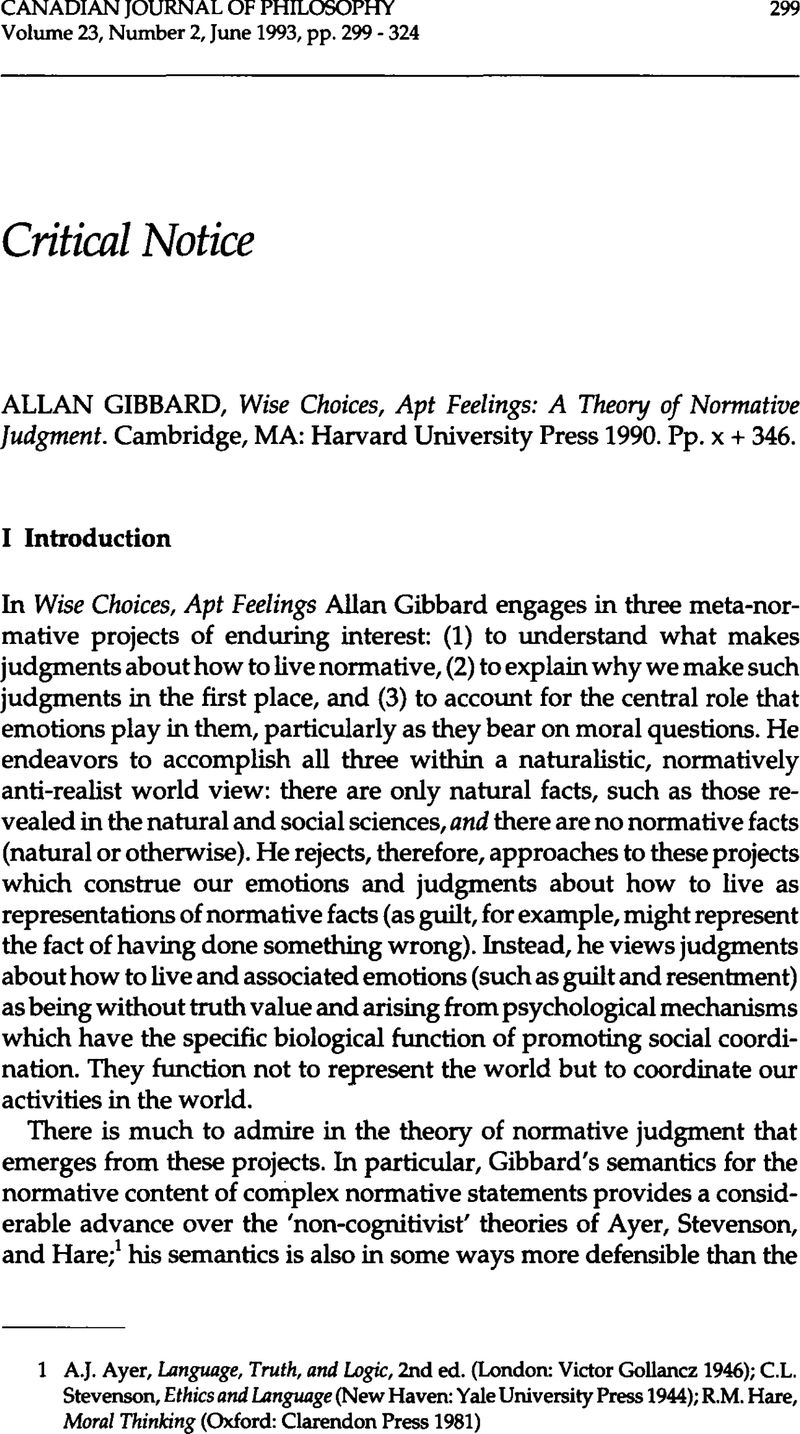Published online by Cambridge University Press: 01 January 2020

1 Ayer, A.J. Language, Truth, and Logic, 2nd ed. (London: Victor Gollancz 1946)Google Scholar; Stevenson, C.L. Ethics and Language (New Haven: Yale University Press 1944)Google Scholar; Hare, R.M. Moral Thinking (Oxford: Clarendon Press 1981)CrossRefGoogle Scholar
2 Blackburn, Simon Spreading the Word (Oxford: Clarendon Press 1984)Google Scholar, Ch. 6
3 Sturgeon, Nicholas ‘What Difference Does It Make Whether Moral Realism Is True?’ The Southern Journal of Philosophy 24 Supplement (1986) 115-41CrossRefGoogle Scholar
4 See her ‘Cartesian Persons’ in Baier, Annette Postures of the Mind (London: Methuen 1985)Google Scholar, esp. 84-6.
5 Brandt, Richard A Theory of the Good and the Right (Oxford: Clarendon Press 1979)Google Scholar
6 I am assuming that the universe of factual-normative worlds is constant across speakers. An alternative interpretation is considered in the last paragraph of this section.
7 Copp, David ‘Nonnativity and the Very Idea of Moral Epistemology,’ The Southern Journal of Philosophy 29 Supplement (1990) 189-210CrossRefGoogle Scholar
8 Copp’s proposal differs slightly; he speaks of a set of norms being justified rather than their application being justified (ibid., 195). One might imagine a set of norms specified so completely that the set of all possible applications would be implicit in it; then, to justify one would be to justify the other. But I doubt that this idea is fully intelligible.
9 Moore’s open question argument may not be defensible, even applied piecemeal, since its use presupposes that the success of an analysis of meaning or a definition can be decided independently of theory construction. Although I do not agree with this presupposition, I am attempting a critique of Gibbard’s position on its own terms.
10 For a clear statement and evaluation of this argument see McNaughton, David Moral Vision (New York: Basil Blackwell 1988), 22-4 and Ch. 7Google Scholar.
11 For systematic discussions of them, see Brink, David Moral Realism and the Foundations of Ethics (Cambridge: Cambridge University Press 1989)CrossRefGoogle Scholar, Ch. 3; and Goldsworthy, Jeffrey ‘Externalism, Intemalism and Moral Realism,’ Australasian Journal of Philosophy 70 (1992) 40-60CrossRefGoogle Scholar.
12 Mackie, J.L. Ethics: Inventing Right and Wrong (New York: Penguin 1977)Google Scholar, Ch. 1
13 In commonsense thinking about motivation, two elements are essential to motivate action: desire and belief. On the assumption that a factual judgment as such involves no desire, it lacks one of the essential elements to motivate action and cannot, therefore, be motivating just by itself. For a critique of this belief-desire theory of motivation, see McNaughton, Moral Vision, 110-13Google Scholar.
14 Brink, David ‘Extemalist Moral Realism,’ The Southern Journal of Philosophy 24 Supplement (1986) 23-41CrossRefGoogle Scholar
15 McNaughton maintains, for example: ‘The moral realist & holds that a moral opinion is a purely cognitive state; it is simply and solely a belief’ (Moral Vision, 22). See also Sayre-McCord, Geoffrey ed., Essays on Moral Realism (Ithaca: Cornell University Press 1988), 5-7Google Scholar.
16 ‘It is a natural function of a system to do Fin an organism & if and only if the system has some of the features it has in that organism because of natural selection to do F’ (109).
17 See Sayre-McCord, Geoffrey ‘Moral Theory and Explanatory Impotence,’ Midwest Studies 12 (1988) 433-57CrossRefGoogle Scholar; reprinted in Essays in Moral Realism.